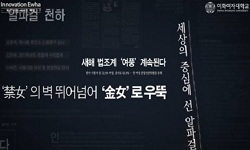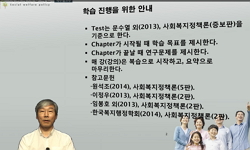In the critical discourses, Hannah Webster Foster`s The Coquette (1797) has long been read as one of seduction novels fraught with didactic moral messages. However, recent criticism rereads the work as a novel with subversive feminist intents. Basical...
http://chineseinput.net/에서 pinyin(병음)방식으로 중국어를 변환할 수 있습니다.
변환된 중국어를 복사하여 사용하시면 됩니다.
- 中文 을 입력하시려면 zhongwen을 입력하시고 space를누르시면됩니다.
- 北京 을 입력하시려면 beijing을 입력하시고 space를 누르시면 됩니다.

포스터의 『교태부리는 여자』 연구 : 페미니즘 선언 또는 도덕적인 이야기? = A Reading of Foster`s The Coquette: A Feminist Manifesto or Another Moral Tale?
한글로보기https://www.riss.kr/link?id=A82604660
- 저자
- 발행기관
- 학술지명
- 권호사항
-
발행연도
2004
-
작성언어
-
- 주제어
-
KDC
843.05
-
등재정보
KCI등재후보
-
자료형태
학술저널
-
수록면
59-78(20쪽)
-
KCI 피인용횟수
0
- 제공처
-
0
상세조회 -
0
다운로드
부가정보
다국어 초록 (Multilingual Abstract)
In the critical discourses, Hannah Webster Foster`s The Coquette (1797) has long been read as one of seduction novels fraught with didactic moral messages. However, recent criticism rereads the work as a novel with subversive feminist intents. Basically following this latter group of critical viewpoints, and taking into consideration the historical and cultural background in which the work was produced, this paper attempts to read The Coquette as a moderate feminist manifesto with all its equivocal didactic elements. Eliza Wharton, the heroine in The Coquette, is portrayed as a woman who struggles to choose a husband of her own free will. She hesitates between a boring but respectable suitor, Reverend Boyer, and a charming but immoral rake, Major Sanford, in spite of her friends` uniform view of Boyer as a better match. Eliza`s indecisiveness, after a while, leads Boyer to leave her, and she finally falls to a victim of Sanford`s seduclton and dies in childbirth. This story seems to confirm the Republican Ideology in which woman`s proper place was confined to a moral center in the family, in the role of a virtuous wife and mother. On the other hand, however, Eliza`s story shows that the status of woman in the early Republic was narrowly limited, and that the ideas of individual independence and freedom were not open to women. Ironically, however, Eliza`s determination to pursue her own freedom is not supported by the tightly-knit circle of her female friends who staunchly vouch for the woman`s role prescribed by the Republican Ideology. Although Eliza`s female friends show a deep sympathy for her conflict and plight, a more subversive possibility of female communal vision is safely contained by a conservative message in the moralistic ending. Therefore, The Coquette can be read only as a moderate feminist manifesto, a `modest proposal` to criticize the limited status of woman in the early America.
참고문헌 (Reference)
1 Evans, Gareth, "“Rakes, Coquettes and Republican Patriarchs: Class, Gender and Nation in Early American Sentimental Fiction.”" 25 (25): 41-62, 1995
2 "“Hanna Webster Foster's The Coquette: Critiquing Franklin’s America.” Redefining the Political Novel: American Women Writers, 1797-1901. Ed. Sharon M. Harris. Knoxville: U of Tennessee P" 1-22, 1995
3 "Walter P. Jr. “The Coquette and the American Dream of Freedom.” Early American Literature 12" 243-55, 1978
4 "Virtue and Seduction in the Early Republic.” William and Mary Quarterly 44" 689-719, 1987
5 "The Seduction Novel of the Early Nation: A Call for Socio-Political Reform." Michigan State UP 1999
6 "The Rise of the Novel in America. New York" 1986.
7 "The Politics of Seduction: Theater, Sexuality, and National Virtue in the Novels of Hannah Foster.” Exceptional Spaces: Essays in Performance and History. Ed. Della Pollock." U of North Carolina P 238-257, 1998
8 "The Plight of Feeling: Sympathy and Dissent in the Early American Novel." U of Chicago P 1997
9 "The Coquette. The Power of Sympathy and The Coquette." : Penguin, 105-242, 1996
10 "States of Sympathy: Seduction and Democracy in the American Novel." Columbia UP 1997
1 Evans, Gareth, "“Rakes, Coquettes and Republican Patriarchs: Class, Gender and Nation in Early American Sentimental Fiction.”" 25 (25): 41-62, 1995
2 "“Hanna Webster Foster's The Coquette: Critiquing Franklin’s America.” Redefining the Political Novel: American Women Writers, 1797-1901. Ed. Sharon M. Harris. Knoxville: U of Tennessee P" 1-22, 1995
3 "Walter P. Jr. “The Coquette and the American Dream of Freedom.” Early American Literature 12" 243-55, 1978
4 "Virtue and Seduction in the Early Republic.” William and Mary Quarterly 44" 689-719, 1987
5 "The Seduction Novel of the Early Nation: A Call for Socio-Political Reform." Michigan State UP 1999
6 "The Rise of the Novel in America. New York" 1986.
7 "The Politics of Seduction: Theater, Sexuality, and National Virtue in the Novels of Hannah Foster.” Exceptional Spaces: Essays in Performance and History. Ed. Della Pollock." U of North Carolina P 238-257, 1998
8 "The Plight of Feeling: Sympathy and Dissent in the Early American Novel." U of Chicago P 1997
9 "The Coquette. The Power of Sympathy and The Coquette." : Penguin, 105-242, 1996
10 "States of Sympathy: Seduction and Democracy in the American Novel." Columbia UP 1997
11 "Michael T. “The Literature of the Revolutionary and Early National Periods.” The Cambridge History of American Literature Vol.1" -693,
12 "Linda K. Women of the Republic Intellect and Ideology in Revolutionary America. Chapel Hill U of North Carolina P" 1980.
13 "Kristie. “An Assault on the Will Republican Virtue and the City in Hannah Webster Foster's The Coquette.” Early American Literature 24" 135-51, 1989
14 "Introduction. The Power of Sympathy and The Coquette." Penguin 1996
15 "Frank. “Mrs. Foster’s Coquette and the Decline of the Brotherly Watch.” Studies in Eighteenth-Century Culture 16" 211-24, 1986
16 "Coquettes and Revolutionaries in Young America.” Literature and the Body Essays on Populations and Persons. Ed. Elaine Scarry. Baltimore" 1988.160-84.
17 "Clarie C. “Sisterhood in a Separate Sphere Female Friendship in Hannah Webster Foster’s The Coquette and The Boarding School.” Early American Literature 27" 1992185-203.
18 "A Guide to Novels by and about Women in America 1820-70. 2nd ed. Urbana U of Illinois P" 1993.
동일학술지(권/호) 다른 논문
-
- 근대 영미소설 학회
- 안동현 ( Dong Hyun Ahn )
- 2004
- KCI등재후보
-
- 근대 영미소설 학회
- 손영희 ( Young Hee Son )
- 2004
- KCI등재후보
-
- 근대 영미소설 학회
- 성은애 ( Eun Ai Sung )
- 2004
- KCI등재후보
-
From Young Satan to No. 44: Mark Twain`s Carnivalesque Laughter
- 근대 영미소설 학회
- Young Jong Yoo
- 2004
- KCI등재후보
분석정보
인용정보 인용지수 설명보기
학술지 이력
| 연월일 | 이력구분 | 이력상세 | 등재구분 |
|---|---|---|---|
| 2026 | 평가예정 | 재인증평가 신청대상 (재인증) | |
| 2020-01-01 | 평가 | 등재학술지 유지 (재인증) |  |
| 2017-01-01 | 평가 | 등재학술지 유지 (계속평가) |  |
| 2013-01-01 | 평가 | 등재학술지 유지 (등재유지) |  |
| 2010-01-01 | 평가 | 등재학술지 유지 (등재유지) |  |
| 2008-06-04 | 학회명변경 | 영문명 : The Korean Society Of British And American Fiction To 1900 -> The Korean Society of British and American Fiction |  |
| 2008-05-29 | 학술지명변경 | 외국어명 : The British and American Novel -> British and American Fiction |  |
| 2008-01-01 | 평가 | 등재학술지 유지 (등재유지) |  |
| 2006-01-24 | 학술지명변경 | 외국어명 : British and American Fiction to 1900 -> The British and American Novel |  |
| 2005-01-01 | 평가 | 등재학술지 선정 (등재후보2차) |  |
| 2004-01-01 | 평가 | 등재후보 1차 PASS (등재후보1차) |  |
| 2003-01-01 | 평가 | 등재후보학술지 유지 (등재후보2차) |  |
| 2002-01-01 | 평가 | 등재후보 1차 PASS (등재후보1차) |  |
| 2000-07-01 | 평가 | 등재후보학술지 선정 (신규평가) |  |
학술지 인용정보
| 기준연도 | WOS-KCI 통합IF(2년) | KCIF(2년) | KCIF(3년) |
|---|---|---|---|
| 2016 | 0.24 | 0.24 | 0.21 |
| KCIF(4년) | KCIF(5년) | 중심성지수(3년) | 즉시성지수 |
| 0.2 | 0.17 | 0.758 | 0.17 |




 KCI
KCI KISS
KISS






